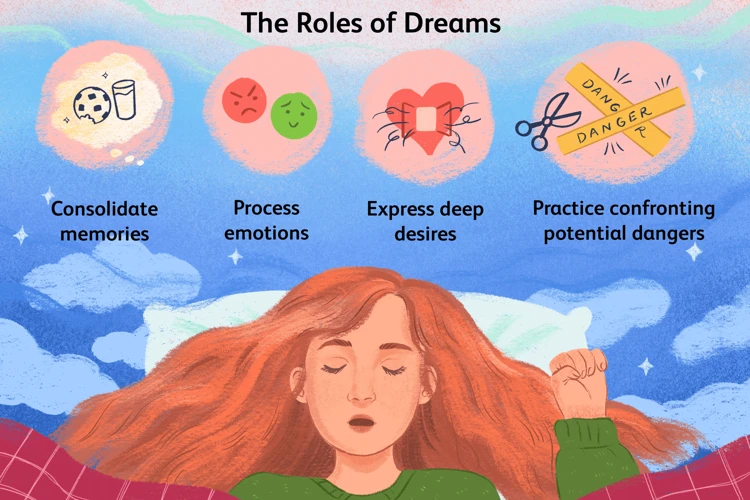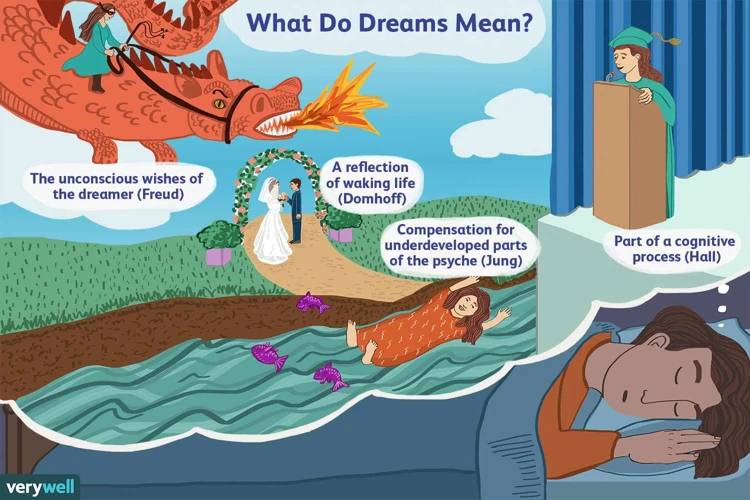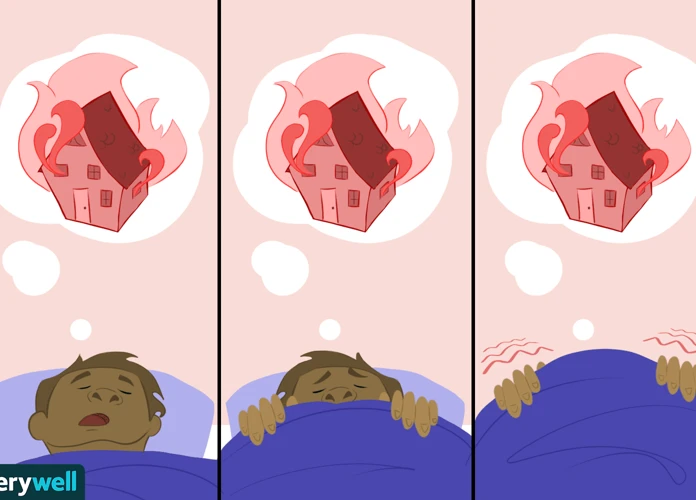Nightmares can be a perplexing and unsettling experience, leaving individuals with feelings of fear and unease long after they wake. Understanding the psychological causes behind these distressing dreams is crucial in finding effective ways to cope and address the underlying issues. By exploring the nature of nightmares, the psychological and physiological factors that contribute to them, and their impact on mental well-being, we can gain valuable insights into this enigmatic phenomenon. This article aims to provide a step-by-step understanding of the various psychological causes of nightmares, offering strategies for coping and treating these disturbing dreams. So, let’s delve into the realm of the subconscious mind and unravel the intricacies of nightmares.
The Nature of Nightmares

Nightmares, often vivid and disturbing dreams that elicit feelings of fear, anxiety, or dread, are a fascinating and perplexing aspect of human psychology. These intense dreams typically occur during REM (rapid eye movement) sleep, a phase when brain activity is high and most dreaming takes place. While nightmares are commonly associated with negative emotions, they can vary widely in terms of content and intensity. Some nightmares may involve specific themes or scenarios, while others may reflect personal fears, anxieties, or traumatic experiences. The nature of nightmares can be influenced by various factors such as individual psychological traits, life experiences, and external stressors. These dreams can tap into the deepest recesses of our subconscious minds, revealing hidden fears, unresolved conflicts, and emotional struggles. Understanding the nature of nightmares provides a foundation for exploring the psychological causes behind them and developing effective strategies for coping and addressing their impact on mental well-being. If you are interested in learning more about common themes and interpretations of nightmares, you can check out our article on common nightmare themes and interpretations.
Psychological Factors in Nightmares

Psychological factors play a significant role in the occurrence of nightmares. One prominent factor is unresolved trauma, where individuals may experience recurring nightmares as a means of processing and revisiting distressing events. Traumatic experiences, such as accidents, abuse, or witnessing violence, can leave a lasting impact on the subconscious mind, leading to the manifestation of these distressing dreams. Additionally, anxiety and stress are common triggers for nightmares, as heightened emotional states can disrupt sleep patterns and contribute to the formation of unsettling dream content. Childhood experiences, both positive and negative, can also influence the occurrence of nightmares in adulthood. These formative years shape our beliefs, fears, and coping mechanisms, which can be reflected in our dreams. Understanding these psychological factors is crucial in addressing and managing nightmares effectively. For tips on managing and overcoming nightmare disorders, refer to our comprehensive guide here.
1. Unresolved Trauma
Unresolved trauma is a significant psychological factor that can contribute to the occurrence of nightmares. Traumatic experiences such as accidents, physical abuse, emotional trauma, or witnessing distressing events can leave a profound impact on an individual’s psyche. Nightmares often serve as a way for the subconscious mind to process and attempt to resolve these unresolved traumas. The content of these nightmares may directly mirror the traumatic event or contain symbolic elements related to the experience. The emotional intensity and frequency of nightmares may vary depending on the severity of the trauma and the individual’s ability to cope. If you are interested in learning more about the role of trauma in nightmares, you can check out our article on the role of trauma in nightmares. It is crucial for individuals who have experienced trauma to seek appropriate support from mental health professionals to address and process these experiences, which can help reduce the frequency and intensity of nightmares.
2. Anxiety and Stress
Anxiety and Stress
Anxiety and stress are two significant psychological factors that can contribute to the occurrence of nightmares. When individuals experience high levels of anxiety and stress, it can disrupt their sleep patterns and impact the content of their dreams. Anxiety is often accompanied by excessive worry, fear, and a sense of impending danger. During sleep, these anxious thoughts and emotions can manifest in the form of nightmares. Stress, on the other hand, can stem from various sources such as work pressures, relationship difficulties, or financial problems. When individuals are under significant stress, their minds may be preoccupied with these concerns, making them more susceptible to nightmares.
In a study conducted by the Sleep Research Society, it was found that individuals with higher levels of anxiety and stress were more likely to experience frequent and intense nightmares. The researchers suggested that anxiety and stress can disrupt the brain’s ability to regulate emotions during sleep, leading to the formation of vivid and distressing dreams.
Additionally, anxiety disorders such as generalized anxiety disorder (GAD), post-traumatic stress disorder (PTSD), and panic disorder can also contribute to an increased likelihood of nightmares. These disorders are characterized by heightened levels of anxiety and can result in intrusive thoughts, flashbacks, and nightmares related to past traumatic events or specific fears.
To address the impact of anxiety and stress on nightmares, it is important to focus on stress management techniques and anxiety reduction strategies. These may include relaxation exercises, mindfulness practices, therapy sessions, and incorporating stress-reducing activities into daily routines. By effectively managing anxiety and stress, individuals can potentially reduce the frequency and intensity of nightmares, promoting better sleep and overall psychological well-being. If you are interested in tips for managing and overcoming nightmare disorders, you can check out our article on managing and overcoming nightmare disorders.
3. Childhood Experiences
Childhood experiences play a significant role in shaping our psychological well-being, and they can also contribute to the occurrence of nightmares. Traumatic events or distressing experiences during childhood can leave a lasting impact on our subconscious minds, resurfacing in the form of nightmares later in life. For example, children who have experienced physical or emotional abuse, neglect, or witnessing violence may have a higher likelihood of experiencing nightmares. These experiences can create deep-seated fears, anxieties, and feelings of vulnerability, which may manifest during sleep as recurrent and distressing dreams. Additionally, traumatic events such as accidents, natural disasters, or major life transitions during childhood can also trigger nightmares. The intensity and frequency of nightmares may vary depending on the individual and the specific nature of the childhood experience. It is important to note that not all individuals who experience childhood trauma will have nightmares, as psychological resilience and coping mechanisms can also influence the manifestation of dreams. However, for those who do experience nightmares as a result of childhood experiences, seeking therapy or counseling can provide a safe space to process and heal from the emotional wounds.
4. Mental Health disorders
Mental health disorders can significantly contribute to the occurrence and intensity of nightmares. Conditions such as post-traumatic stress disorder (PTSD), depression, anxiety disorders, and schizophrenia are known to be associated with increased nightmares. In individuals with PTSD, nightmares often revolve around the traumatic event they have experienced, replaying vivid and distressing scenes. These nightmares can further exacerbate symptoms of anxiety, fear, and sleep disturbances. Depression and anxiety disorders can also disrupt sleep patterns, leading to an increased likelihood of nightmares. Individuals with schizophrenia may experience nightmares as a result of hallucinations and delusions that manifest during sleep. The presence of these mental health disorders can create a heightened vulnerability to nightmares and further impact overall mental well-being. It is essential for individuals experiencing frequent nightmares alongside mental health disorders to seek professional help and treatment to address the underlying conditions effectively.
5. Substance Abuse
Substance abuse can have a significant impact on the occurrence and content of nightmares. When individuals engage in substance abuse, particularly with drugs or alcohol, it can disrupt the normal sleep cycle and interfere with the brain’s ability to process information during sleep. As a result, nightmares can become more frequent and intense. Additionally, certain substances may alter brain chemistry, leading to heightened feelings of anxiety, fear, and paranoia, which can manifest in nightmares. The substances most commonly associated with nightmares include alcohol, opioids, sedatives, and stimulants. Alcohol, for example, is known to suppress REM sleep in the early part of the night, which can result in a rebound effect later in the night, leading to vivid and distressing dreams. Similarly, drugs like opioids and sedatives can disrupt the normal sleep architecture and increase the likelihood of experiencing nightmares. It is important to note that substance abuse not only contributes to the occurrence of nightmares but can also exacerbate existing mental health conditions, leading to a vicious cycle of distress and sleep disturbance. If you or someone you know is struggling with substance abuse and experiencing nightmares as a result, seeking professional help and support is vital for both addiction recovery and better sleep quality.
Physiological Influences

Physiological influences play a significant role in the occurrence and intensity of nightmares. Certain medications and drugs, such as antidepressants and beta-blockers, have been known to cause vivid and disturbing dreams as a side effect. Additionally, individuals with sleep disorders, such as sleep apnea or restless leg syndrome, may experience an increased frequency of nightmares. Sleep deprivation, whether due to chronic insomnia or irregular sleep patterns, can also contribute to the occurrence of nightmares. These physiological factors disrupt normal sleep cycles and can lead to REM rebound, characterized by a higher occurrence of intense dreaming, including nightmares. Understanding the impact of these physiological influences on nightmares is crucial in developing effective treatment strategies and promoting healthy sleep hygiene.
1. Medications and Drugs
Medications and drugs can play a significant role in influencing the occurrence of nightmares. Certain medications, particularly those that affect the central nervous system, may have side effects that include vivid and disturbing dreams. For example, antidepressants, antipsychotics, and medications used to treat Parkinson’s disease have been known to induce nightmares in some individuals. Additionally, withdrawal from substances such as alcohol, opioids, or sedatives can also trigger nightmares as the body adjusts to the absence of these substances. The impact of medications and drugs on nightmares can vary from person to person, and it is essential to consult with a healthcare professional if experiencing persistent or troubling nightmares as a result of medication use. In some cases, adjusting the dosage or switching to an alternative medication may alleviate the occurrence of nightmares. It is crucial to prioritize open communication with healthcare providers to ensure medication regimens are tailored to individual needs and minimize the potential for disruptive dreams.
2. Sleep Disorders
Sleep disorders can significantly contribute to the occurrence and intensity of nightmares. One common sleep disorder that is associated with frequent nightmares is known as REM sleep behavior disorder (RBD). RBD is characterized by the absence of muscle atonia during REM sleep, which allows individuals to physically act out their dreams. This can lead to vivid and sometimes violent nightmares.
Another sleep disorder that can influence the prevalence of nightmares is sleep apnea. Sleep apnea is a condition characterized by pauses in breathing during sleep. These interruptions in breathing can cause fragmented and disrupted sleep, leading to an increased likelihood of experiencing nightmares.
Additionally, insomnia, a common sleep disorder characterized by difficulty falling or staying asleep, can also contribute to the occurrence of nightmares. When individuals struggle to achieve a restful night’s sleep, their REM sleep phases may become lengthened, leading to a higher frequency of nightmares.
It is important to note that diagnosing and treating sleep disorders can be crucial in managing and reducing the impact of nightmares. Seeking the help of a healthcare professional or sleep specialist can aid in identifying and addressing any underlying sleep disorders that may be contributing to the occurrence of nightmares.
Some strategies that can be helpful for managing sleep disorders and reducing the occurrence of nightmares include practicing good sleep hygiene, such as maintaining a regular sleep schedule, creating a comfortable sleep environment, and avoiding stimulants like caffeine before bed. Additionally, relaxation techniques and stress reduction methods, such as mindfulness meditation or deep breathing exercises, can help promote better sleep and reduce the likelihood of nightmares.
By addressing and managing sleep disorders, individuals can improve their sleep quality, reduce the occurrence of nightmares, and ultimately enhance their overall mental well-being.
3. Sleep Deprivation
Sleep deprivation, the condition of not getting enough sleep, can have a significant impact on the frequency and intensity of nightmares experienced. When we don’t get sufficient sleep, our brain’s functioning can become disrupted, leading to a variety of negative effects, including an increase in nightmares. There are several ways in which sleep deprivation can contribute to the occurrence of nightmares:
1. REM Rebound: When we lack sleep, we tend to experience what is known as REM rebound. REM sleep is the stage of sleep where most dreaming occurs, and when we are sleep deprived, our body tries to compensate for the lack of REM sleep by increasing the time spent in this stage. This can lead to more intense and vivid dreams, including nightmares.
2. Increase in Stress: Sleep deprivation can also lead to increased stress levels. When we are sleep deprived, our bodies experience heightened levels of stress hormones such as cortisol. Elevated stress can influence the content of our dreams, making them more anxiety-provoking and increasing the likelihood of nightmares.
3. Disruption in Brain Functioning: Lack of sleep can disrupt the normal functioning of the brain, impacting its ability to regulate emotions and process experiences effectively. This can result in an amplification of negative emotions, traumatic experiences, or unresolved conflicts, which may manifest as nightmares during sleep.
4. Interference with Memory Consolidation: Sleep plays a crucial role in memory consolidation, helping us to process and integrate new information. When we are sleep deprived, this process can be impaired, leading to difficulties in processing and resolving emotional experiences. This can contribute to the occurrence of nightmares as the brain tries to make sense of and process fragmented memories.
To mitigate the impact of sleep deprivation on nightmares, it is essential to prioritize healthy sleep habits and establish a consistent sleep routine. This includes ensuring sufficient time for sleep, creating a conducive sleep environment, practicing relaxation techniques before bedtime, and avoiding stimulants, such as caffeine, close to bedtime. By addressing sleep deprivation, individuals can reduce the risk of experiencing distressing nightmares and improve their overall sleep quality.
Effect on Mental Well-being

The effect of nightmares on mental well-being should not be underestimated. These distressing dreams can have a profound impact on an individual’s psychological state. Firstly, frequent nightmares can disrupt normal sleep patterns, leading to sleep disturbances and sleep deprivation. This can result in daytime fatigue, decreased cognitive function, and mood disturbances. Additionally, nightmares often evoke intense emotions such as fear, anxiety, and sadness, which can negatively affect overall mental well-being. The emotional distress caused by nightmares may lead to heightened levels of stress, irritability, and even symptoms of depression or anxiety disorders. Nightmares can also trigger intrusive thoughts and memories related to past trauma, exacerbating symptoms of post-traumatic stress disorder (PTSD). Individuals who experience chronic nightmares may develop fear of falling asleep, leading to insomnia and worsening of sleep-related problems. The cumulative toll of these effects on mental well-being can be significant, impacting daily functioning, relationships, and overall quality of life. It is important for individuals experiencing distressing nightmares to seek support, as there are various coping strategies and treatment options available to alleviate their negative impact.
Coping Strategies

When facing the distressing effects of nightmares, implementing effective coping strategies is essential for alleviating their impact on mental well-being. There are several therapeutic techniques that individuals can employ to address and manage nightmares. These techniques include imagery rehearsal therapy, where individuals reconstruct their nightmares and transform them into positive scenarios, cognitive behavioral therapy, which helps individuals identify and challenge negative thought patterns associated with nightmares, and relaxation techniques such as deep breathing and progressive muscle relaxation to reduce anxiety and promote better sleep. Additionally, stress reduction strategies play a crucial role in managing nightmares. Engaging in activities that help reduce stress levels, such as exercise, meditation, and hobbies, can contribute to a better sleep environment and decrease the likelihood of nightmares. Finally, practicing good sleep hygiene is essential in preventing nightmares. This includes establishing a consistent bedtime routine, creating a comfortable sleep environment, avoiding stimulating activities before bed, and ensuring optimal sleep duration. By incorporating these coping strategies, individuals can strive to reduce the frequency and intensity of nightmares, leading to improved overall well-being.
1. Therapeutic Techniques
Therapeutic techniques play a vital role in addressing and managing nightmares. These techniques aim to uncover and resolve underlying psychological issues that contribute to the occurrence of nightmares. One commonly used therapeutic approach is cognitive-behavioral therapy (CBT). CBT for nightmares involves identifying and challenging negative thoughts and beliefs associated with the dreams. This therapy helps individuals develop more adaptive and positive thoughts, reducing the emotional impact of nightmares. Another effective technique is imagery rehearsal therapy (IRT). IRT involves rehearsing and mentally rewiring the content and outcome of nightmares to create a more positive and less distressing dream scenario. This technique helps individuals gain a sense of control and empowerment over their dreams and reduce the likelihood of recurring nightmares. Eye movement desensitization and reprocessing (EMDR) therapy is also used to address nightmares related to traumatic experiences. EMDR helps individuals process and reprocess traumatic memories, reducing their influence over dreams and decreasing the frequency and intensity of nightmares. Other therapeutic techniques, such as relaxation exercises, mindfulness meditation, and art therapy, may also be incorporated to help individuals manage stress, improve sleep quality, and reduce the occurrence of nightmares. The choice of therapeutic technique depends on the individual’s unique needs and preferences. It is important to consult with a qualified mental health professional to determine the most suitable therapeutic approach for addressing nightmares. Therapeutic techniques can be powerful tools in helping individuals gain control over their dreams and alleviate the distress caused by nightmares.
2. Stress Reduction
Stress reduction techniques play a vital role in managing and alleviating the frequency and intensity of nightmares. Here are several strategies that can help individuals reduce stress levels:
Mindfulness and Meditation: Engaging in mindfulness practices and meditation can help calm the mind, reduce anxiety, and promote relaxation. These techniques focus on being present in the moment and observing thoughts and feelings without judgment. Regular practice can improve overall well-being and reduce stress, which may contribute to a decrease in the occurrence of nightmares.
Deep Breathing Exercises: Deep breathing exercises are a simple yet effective way to activate the body’s natural relaxation response. By inhaling deeply through the nose and exhaling slowly through the mouth, individuals can slow their heart rate, lower blood pressure, and induce a sense of calm. Practicing deep breathing before bed can create a peaceful mindset and reduce stress, potentially mitigating the likelihood of nightmares.
Physical Activity: Engaging in regular physical activity is known to alleviate stress and promote better sleep. Exercise releases endorphins, which are natural mood enhancers, and helps to reduce anxiety and tension. Incorporating activities such as jogging, yoga, or dancing into a daily routine can contribute to overall well-being and improve sleep quality, leading to a decreased chance of experiencing nightmares.
Journaling: Writing down thoughts, worries, and emotions in a journal can be a therapeutic tool for stress reduction. By putting thoughts onto paper, individuals can gain clarity and perspective, releasing pent-up emotions and reducing the mental burden that often accompanies stress. Taking a few minutes each day to jot down thoughts before bedtime can help clear the mind and promote a more restful sleep.
Relaxation Techniques: Various relaxation techniques, such as progressive muscle relaxation or guided imagery, can be helpful in reducing stress levels and promoting a sense of calm before sleep. Progressive muscle relaxation involves tensing and then releasing individual muscle groups, promoting deep relaxation throughout the body. Guided imagery involves visualizing peaceful and serene scenes, allowing the mind to shift away from stress and anxiety.
Incorporating stress reduction techniques into a daily routine can significantly reduce the impact of stress on both sleep quality and the occurrence of nightmares. By adopting one or more of these strategies, individuals can take proactive steps towards managing stress and improving overall well-being.
3. Sleep Hygiene
Sleep hygiene plays a crucial role in promoting quality sleep and reducing the frequency of nightmares. By adopting healthy sleep habits and maintaining a consistent sleep routine, individuals can create an optimal sleep environment that fosters restful and peaceful sleep. Here are some key practices to improve sleep hygiene:
1. Stick to a consistent sleep schedule: Establishing a regular sleep schedule, going to bed and waking up at the same time every day, even on weekends, helps regulate the body’s internal clock. This consistency promotes better sleep quality and can reduce the occurrence of nightmares.
2. Create a relaxing bedtime routine: Engaging in relaxing activities before bed helps signal the body to wind down and prepare for sleep. This may include reading a book, taking a warm bath, practicing relaxation techniques, or listening to calming music. Avoid stimulating activities, such as screen time or intense exercise, close to bedtime.
3. Design a comfortable sleep environment: Make sure your bedroom is conducive to sleep by keeping it cool, dark, and quiet. Use comfortable bedding and invest in a supportive mattress and pillows. Remove electronic devices that emit blue light as this can disrupt sleep patterns.
4. Limit caffeine and alcohol intake: Both caffeine and alcohol can interfere with sleep and contribute to restless nights. Avoid consuming them in the hours leading up to bedtime.
5. Avoid heavy meals and fluid intake before bed: Eating a large, heavy meal close to bedtime can cause discomfort and disrupt sleep. Additionally, consuming excessive fluids may lead to frequent awakenings for bathroom trips during the night.
6. Establish a wind-down period: Allow yourself time to unwind before going to bed. Engage in relaxation techniques, such as deep breathing or practicing mindfulness, to help calm the mind and promote a peaceful state before sleep.
By incorporating these sleep hygiene practices into your daily routine, you can create an environment that promotes better sleep quality and decreases the likelihood of experiencing nightmares.
Treating Underlying Causes
Treating the underlying causes of nightmares is crucial for individuals seeking relief from these distressing dreams. Addressing the root causes can lead to a significant reduction in nightmare frequency and intensity. Here are several approaches commonly used to treat the psychological and physiological factors contributing to nightmares:
1. Therapy: Psychotherapy, such as cognitive-behavioral therapy (CBT), can be effective in treating underlying psychological issues that contribute to nightmares. Through therapy, individuals can explore and process unresolved traumas, anxieties, and fears that manifest in their dreams. Therapists may use techniques like exposure therapy, imagery rehearsal therapy, or EMDR (eye movement desensitization and reprocessing) to help individuals reframe their nightmares and develop coping strategies.
2. Medications: In some cases, medications may be prescribed to manage nightmares, especially if they are a symptom of an underlying mental health condition such as post-traumatic stress disorder (PTSD). Medications like selective serotonin reuptake inhibitors (SSRIs) or prazosin, an alpha-blocker, can help reduce the frequency and intensity of nightmares.
3. Relaxation Techniques: Practicing relaxation techniques, such as deep breathing, progressive muscle relaxation, or mindfulness meditation, can be helpful in reducing stress and anxiety levels, which can contribute to nightmares. These techniques promote a sense of calm and relaxation, improving overall sleep quality.
4. Sleep Environment: Creating a sleep environment that promotes relaxation and tranquility is essential for managing nightmares. Ensure the bedroom is dark, quiet, and at a comfortable temperature. Establishing a regular sleep routine and engaging in relaxing activities before bed can also contribute to a more restful sleep.
5. Lifestyle Changes: Making positive lifestyle changes, such as reducing alcohol and caffeine intake, managing stress levels, and incorporating regular exercise into daily routines, can have a significant impact on improving sleep quality and reducing the occurrence of nightmares.
By addressing the underlying causes of nightmares through a combination of therapy, medication (if necessary), relaxation techniques, and lifestyle adjustments, individuals can find relief and improve their overall well-being. It’s important to work with healthcare professionals to determine the most appropriate treatment plan based on individual circumstances and needs.
Conclusion
In conclusion, understanding the psychological causes of nightmares is essential in addressing and managing these unsettling dreams. Nightmares can stem from a variety of factors, including unresolved trauma, anxiety and stress, childhood experiences, mental health disorders, and substance abuse. Additionally, physiological influences such as medications, sleep disorders, and sleep deprivation can also contribute to the frequency and intensity of nightmares. The impact of nightmares on mental well-being should not be overlooked, as they can lead to increased anxiety, sleep disturbances, and decreased overall quality of life. However, there are coping strategies available, including therapeutic techniques, stress reduction strategies, and implementing good sleep hygiene practices, that can help individuals manage nightmares more effectively. It is also important to consider treating the underlying causes of nightmares, such as trauma or mental health disorders, to address the root of the issue. By taking a comprehensive approach and seeking professional help if needed, individuals can find relief and gain better control over their dream experiences. Remember, if you need more information on managing and overcoming nightmare disorders, you can refer to our helpful tips article on managing and overcoming nightmare disorders.
Frequently Asked Questions
1. Why do nightmares feel so realistic?
Nightmares can feel incredibly realistic due to the heightened emotional and sensory experiences that occur during REM sleep. During this stage, the brain is highly active, and the level of brainwave activity is similar to that of wakefulness. This increased brain activity can make the events and emotions in nightmares feel vivid and lifelike.
2. Are nightmares a sign of a mental health disorder?
Nightmares alone are not necessarily indicative of a mental health disorder. They can be a normal part of the dream cycle. However, frequent and distressing nightmares can be associated with mental health disorders such as post-traumatic stress disorder (PTSD), anxiety disorders, or depression. If nightmares significantly impact daily life or cause significant distress, it may be useful to consult with a mental health professional.
3. Can eating certain foods before bed cause nightmares?
While certain foods, such as spicy or heavy meals, can disrupt sleep and increase the likelihood of vivid dreams, there is no direct evidence linking specific foods to nightmares. However, individual reactions to food can vary, so it’s helpful to pay attention to how different foods or beverages affect your sleep quality.
4. How can I differentiate between a nightmare and a night terror?
Nightmares and night terrors are two separate sleep disturbances. Nightmares occur during REM sleep and are often remembered upon waking, while night terrors are partial awakenings from deep non-REM sleep and are typically not remembered. Night terrors are often accompanied by intense fear, screaming, and physical agitation, whereas nightmares are characterized by distressing dreams.
5. Can medications cause nightmares?
Yes, certain medications can potentially contribute to experiencing nightmares. Medications such as antidepressants, beta-blockers, and some blood pressure medications have been known to affect the content and frequency of dreams. If you suspect that your medication is causing nightmares, it’s important to consult with your healthcare provider for further guidance.
6. Can recurring nightmares be a sign of unresolved trauma?
Recurring nightmares can sometimes indicate unresolved trauma. Traumatic experiences can leave a significant impact on the subconscious mind, leading to the reenactment of distressing events in dreams. If you are experiencing recurring nightmares related to trauma, it may be helpful to seek therapy or counseling to address and process the underlying unresolved issues.
7. Are children more prone to nightmares than adults?
Children are indeed more prone to nightmares compared to adults. Nightmare frequency tends to peak between the ages of 3 and 6, gradually decreasing as children get older. This can be attributed to their active imaginations, developing cognitive abilities, and the processing of new emotions and experiences.
8. Can practicing relaxation techniques before bed reduce the occurrence of nightmares?
Yes, practicing relaxation techniques, such as deep breathing, meditation, or progressive muscle relaxation, before bedtime can help reduce stress and promote a sense of calm. By creating a relaxed and peaceful environment, you may decrease the likelihood of experiencing nightmares and improve the overall quality of sleep.
9. Is it possible to control the content of our nightmares?
While it is challenging to directly control the content of nightmares, developing lucid dreaming techniques may offer some degree of control. Lucid dreaming involves becoming aware that you are dreaming during a dream, which can potentially allow you to actively influence the course of the dream or wake yourself up from a nightmare.
10. Can positive lifestyle changes help alleviate nightmares?
Absolutely! Positive lifestyle changes such as regular exercise, stress reduction techniques, maintaining a consistent sleep schedule, and creating a soothing sleep environment can significantly improve sleep quality and reduce the occurrence of nightmares. Taking care of your overall well-being and practicing good sleep hygiene can contribute to a more peaceful and restful night’s sleep.








